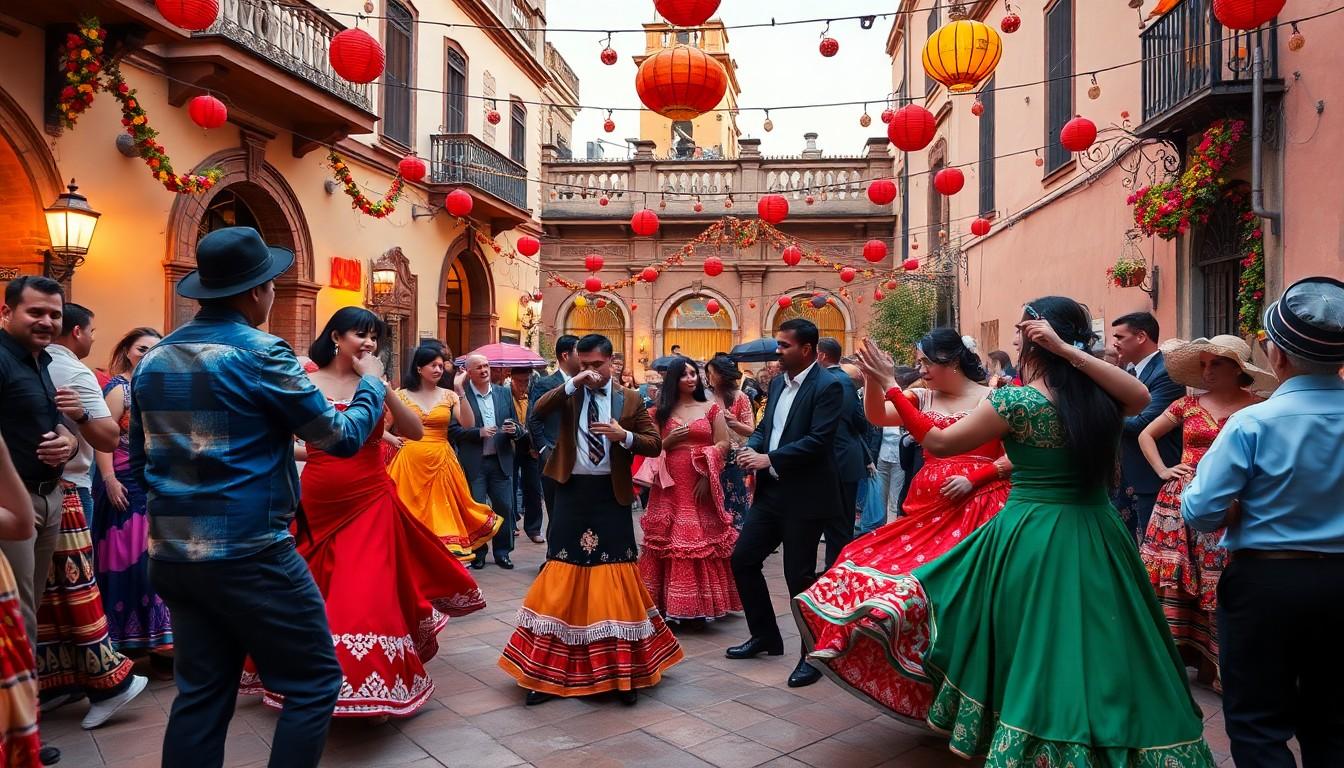In Spain, family traditions are the glue that holds the colorful tapestry of life together. Picture this: a lively Sunday gathering where laughter dances through the air, delicious paella sizzles on the stove, and everyone argues over who makes the best flan. It’s not just about the food; it’s about the stories, the memories, and the slightly chaotic love that binds families together.
Table of Contents
ToggleOverview of Family Traditions in Spain
Family traditions in Spain create a strong bond among relatives and reflect cultural values. Every Sunday, families gather for large meals, emphasizing togetherness. Friends and relatives share dishes like paella, highlighting Spain’s regional cuisines. Lively debates often arise over culinary supremacy, particularly regarding desserts such as flan.
In addition to meals, cultural events play a crucial role in family life. Celebrations like Christmas and Easter involve unique traditions that families uphold yearly. During Christmas, families enjoy the Feast of the Three Kings, often exchanging gifts and partaking in sweet pastries. Easter brings Semana Santa processions, where families participate together, fostering community spirit.
Family gatherings often extend beyond immediate relatives. Cousins, aunts, and uncles join, creating a diverse atmosphere filled with stories and laughter. Grandparents serve as storytellers, sharing tales that enrich the family heritage. Respect for elders remains a significant part of these gatherings.
Cultural rituals also mark important life stages. Weddings, for example, feature traditional customs like the “la novia” dance, bringing families together in celebration. Each event highlights the unique aspects of Spanish heritage while reinforcing family ties.
Values such as respect, loyalty, and love are embedded in these traditions. Families celebrate milestones, life achievements, and even rituals of remembrance. Spanish family traditions contribute significantly to a cohesive identity, fostering connections across generations.
Regional Variations in Family Traditions

Family traditions across Spain showcase captivating regional diversity. Each area boasts unique practices that enrich the family bond.
Northern Spain Traditions
In Northern Spain, families often celebrate traditions with a strong connection to nature. Festivals like the “Fiestas de San Juan” include bonfires and coastal gatherings. Many families participate in the “Gynkhana,” a playful competition involving challenges set across various landscapes. Culinary traditions, such as seafood feasts, deepen family ties during gatherings. In regions like Asturias, families savor traditional dishes while sharing stories from generations. These gatherings often include music and dancing, creating a vibrant atmosphere of celebration.
Southern Spain Traditions
Southern Spain highlights vibrant family gatherings that embrace music and dance. The “Feria de Abril” in Seville presents families in colorful traditional attire, enjoying flamenco performances together. Important life events, such as weddings, are celebrated with lively receptions filled with local customs. Families also partake in “Semana Santa” observances, fostering unity through religious processions. Traditional dishes like gazpacho bring everyone together at mealtime, showcasing regional flavors. These cultural elements combine to create lasting memories cherished by families across generations.
Importance of Family Gatherings
Family gatherings hold significant value in Spanish culture, strengthening bonds and sharing traditions. These events foster connection, enriched by various celebrations and everyday rituals.
Celebrations and Special Occasions
Celebrations such as Christmas and Easter bring families together, creating lasting memories. During the Feast of the Three Kings, families exchange gifts and enjoy roscón de Reyes, a traditional pastry. Semana Santa’s processions unite families and communities through shared faith and awe-inspiring displays. Weddings serve to celebrate love and heritage, featuring the traditional “la novia” dance, which signifies unity and joy. Local festivals also play a vital role, as families participate in annual events that reflect regional identity and collective pride.
Weekly Family Rituals
Weekly family rituals often take place on Sundays, characterized by shared meals and lively conversation. Families gather to enjoy traditional dishes like paella, nurturing connections over delicious food. Grandparents often share stories, passing down cultural knowledge and values. Shared experiences, such as playing games or taking walks, contribute to strengthening relationships. Similarity in customs across regions fosters a sense of belonging, creating a comforting routine that families cherish.
Influence of Religion on Family Traditions
Religion significantly shapes family traditions in Spain. Catholicism serves as the predominant faith, guiding numerous cultural practices. Many families observe religious holidays, integrating them into their traditional gatherings. For instance, Christmas celebrations prominently feature the Feast of the Three Kings, where families exchange gifts and enjoy the special dessert known as roscón de reyes.
Semana Santa, or Holy Week, showcases large processions that foster community spirit and involve family participation. Participants embody rich cultural heritage through heartfelt rituals, reflecting deep-seated beliefs. Processions often draw entire families, creating a blend of spirituality and familial bonding.
Baptisms and First Communions also hold pivotal roles in family traditions. Celebrating these milestones brings families and friends together, reinforcing social ties. Families often gather after ceremonies for festive meals, highlighting cultural dishes that vary by region. These celebrations convey values of commitment and faith, further strengthening familial connections.
Notably, rituals surrounding life events, such as weddings, are steeped in religious significance. Couples often incorporate traditional elements, like church ceremonies, and engage families in the festivities. This integration emphasizes unity and shared beliefs among relatives.
Families also pass down religious traditions through storytelling, further enriching family heritage. Grandparents frequently share tales of past celebrations, ensuring younger generations remain connected to their roots. Through these narratives, families maintain a sense of belonging and identity that transcends time.
Ultimately, the influence of religion pervades family traditions, intertwining faith with daily life. Exploring these connections reveals how religious beliefs enrich the Spanish family’s cultural fabric, creating a supportive environment that nourishes relationships and fosters unity.
Modern Changes to Traditional Family Practices
Modern influences are reshaping traditional family practices in Spain. Increased globalization introduces new customs and ideas that blend with established traditions. Families often adapt rituals, infusing them with contemporary elements while preserving cultural significance. For instance, digital technology plays a crucial role in communication, facilitating connections with distant relatives during celebrations.
Younger generations typically prioritize convenience, leading to changes in how family gatherings are organized. Instead of preparing elaborate meals from scratch, many opt for catering or potluck styles to save time while still enjoying communal eating experiences. Regional dishes, though still cherished, sometimes see modern interpretations, allowing families to experiment with flavors.
Lifestyle shifts also impact the frequency of gatherings. Urban living can complicate traditional Sunday reunions as busy schedules limit available time. However, families are increasingly finding ways to incorporate togetherness into daily life, such as hosting smaller, casual meet-ups throughout the week.
Cultural awareness and appreciation for diversity add further complexity to family practices. Intercultural marriages introduce new traditions that families often merge with their own. Consequently, this fusion enriches the familial tapestry, promoting understanding and acceptance among different backgrounds.
Religious observances still hold significant importance, yet younger generations often interpret these traditions with a fresh perspective. For example, they may wish to create new ways to engage with religious events, focusing more on shared experiences than strict adherence to rituals. This evolution shows how Spanish family traditions maintain relevance while embracing change.
Family traditions in Spain are a beautiful blend of cultural heritage and modern influences. They create a sense of belonging that transcends generations. Whether through lively Sunday gatherings or vibrant celebrations like Semana Santa, these traditions foster deep connections among family members.
As families adapt to contemporary life, the essence of togetherness remains strong. The intertwining of old customs with new practices highlights the resilience of Spanish culture. Ultimately, these cherished traditions not only enrich family bonds but also ensure that the spirit of community continues to thrive in an ever-changing world.


